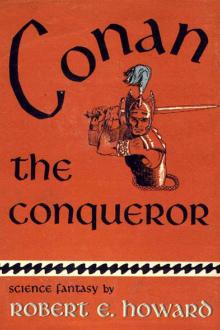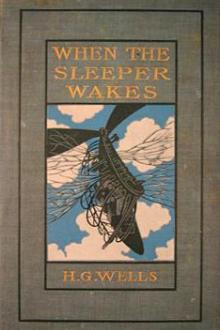The Hour of the Dragon, Robert E. Howard [best ebook reader for laptop txt] 📗

- Author: Robert E. Howard
- Performer: -
Book online «The Hour of the Dragon, Robert E. Howard [best ebook reader for laptop txt] 📗». Author Robert E. Howard
scallop. Into this cavern came some of the same dark, wiry men who had
borne the mummy-case. They seized the golden vessel, and then the
shadows swirled around them and what happened he could not say. But he
saw a glimmer in a whorl of darkness, like a ball of living fire. Then
the smoke was only smoke, drifting up from the fire of tamarisk
chunks, thinning and fading.
“But what does this portend?” he demanded, bewildered. “What I saw in
Tarantia I can understand. But what means this glimpse of Zamorian
thieves sneaking through a subterranean temple of Set, in Stygia? And
that cavern-I’ve never seen or heard of anything like it, in all my
wanderings. If you can show me that much, these shreds of vision which
mean nothing, disjointed, why can you not show me all that is to
occur?”
Zeiata stirred the fire without replying.
“These things are governed by immutable laws,” she said at last. “I
can not make you understand; I do not altogether understand myself,
though I have sought wisdom in the silences of the high places for
more years than I can remember. I cannot save you, though I would if I
might. Man must, at last, work out his own salvation. Yet perhaps
wisdom may come to me in dreams, and in the morn I may be able to give
you the clue to the enigma.”
“What enigma?” he demanded.
“The mystery that confronts you, whereby you have lost a kingdom,” she
answered. And then she spread a sheepskin upon the floor before the
hearth. “Sleep,” she said briefly. Without a word he stretched himself
upon it, and sank into restless but deep sleep through which phantoms
moved silently and monstrous shapeless shadows crept. Once, limned
against a purple sunless horizon, he saw the mighty walls and towers
of a great city of such as rose nowhere on the waking earth he knew.
Its colossal pylons and purple minarets lifted toward the stars, and
over it, floating like a giant mirage, hovered the bearded countenance
of the man Xaltotun.
Conan woke in the chill whiteness of early dawn, to see Zelata
crouched beside the tiny fire. He had not awakened once in the night,
and the sound of the great wolf leaving or entering should have roused
him. Yet the wolf was there, beside the hearth, with its shaggy coat
wet with dew, and with more than dew. Blood glistened wetly amid the
thick fell, and there was a cut upon his shoulder.
Zeiata nodded, without looking around, as if reading the thoughts of
her royal guest.
“He has hunted before dawn, and red was the hunting. I think the man
who hunted a king will hunt no more, neither man nor beast.”
Conan stared at the great beast with strange fascination as he moved
to take the food Zelata offered him.
“When I come to my throne again I won’t forget,” he said briefly.
“You’ve befriended me-by Crom, I can’t remember when I’ve lain down
and slept at the mercy of man or woman as I did last night. But what
of the riddle you would read me this morn?”
A long silence ensued, in which the crackle of the tamarisks was loud
on the hearth.
“Find the heart of your kingdom,” she said at last. “There lies your
defeat and your power. You fight more than mortal man. You will not
press the throne again unless you find the heart of your kingdom.”
“Do you mean the city of Tarantia?”
She shook her head. “I am but an oracle, through whose lips the gods
speak. My lips are sealed by them lest I speak too much. You must find
the heart of your kingdom. I can say no more. My lips are opened and
sealed by the gods.”
Dawn was still white on the peaks when Conan rode westward. A glance
back showed him Zelata standing in the door of her hut, inscrutable as
ever, the great wolf beside her.
A gray sky arched overhead, and a moaning wind was chill with a
promise of winter. Brown leaves fluttered slowly down from the bare
branches, sifting upon his mailed shoulders.
All day he pushed through the hills, avoiding roads and villages.
Toward nightfall he began to drop down from the heights, tier by tier,
and saw the broad plains of Aquilonia spread out beneath him.
Villages and farms lay close to the foot of the hills on the western
side of the mountains for, for half a century, most of the raiding
across the frontier had been done by the Aquilonians. But now only
embers and ashes showed where farm huts and villas had stood.
In the gathering darkness Conan rode slowly on. There was little fear
of discovery, which he dreaded from friend as well as from foe. The
Nemedians had remembered old scores on their westward drive, and
Valerius had made no attempt to restrain his allies. He did not count
on winning the love of the common people. A vast swath of desolation
had been cut through the country from the foothills westward. Conan
cursed as he rode over blackened expanses that had been rich fields,
and saw the gaunt gable-ends of burned houses jutting against the sky.
He moved through an empty and deserted land, like a ghost out of a
forgotten and outworn past.
The speed with which the army had traversed the land showed what
little resistance it had encountered. Yet had Conan been leading his
Aquilonians the invading army would have been forced to buy every foot
they gained with their blood. The bitter realization permeated his
soul; he was not the representative of a dynasty. He was only a lone
adventurer. Even the drop of dynastic blood Valerius boasted had more
hold on the minds of men than the memory of Conan and the freedom and
power he had given the kingdom.
No pursuers followed him down out of the hills. He watched for
wandering or returning Nemedian troops, but met none. Skulkers gave
him a wide path, supposing him to be one of the conquerors, what of
his harness. Groves and rivers were far more plentiful on the western
side of the mountains, and coverts for concealment were not lacking.
So he moved across the pillaged land, halting only to rest his horse,
eating frugally of the food Zeiata had given him, until, on a dawn
when he lay hidden on a river bank where willows and oaks grew
thickly, he glimpsed, afar, across the rolling plains dotted with rich
groves, the blue and golden towers of Tarantia.
He was no longer in a deserted land, but one teeming with varied life.
His progress thenceforth was slow and cautious, through thick woods
and unfrequented byways. It was dusk when he reached the plantation of
Servius Galannus.
THE COUNTRYSIDE ABOUT Tarantia had escaped the fearful ravaging of the
more easterly provinces. There were evidences of the march of a
conquering army in broken hedges, plundered fields and looted
granaries, but torch and steel had not been loosed wholesale.
There was but one grim splotch on the landscape-a charred expanse of
ashes and blackened stone, where, Conan knew, had once stood the
stately villa of one of his staunchest supporters.
The king dared not openly approach the Galannus farm, which lay only a
few miles from the city. In the twilight he rode through an extensive
woodland, until he sighted a keeper’s lodge through the trees.
Dismounting and tying his horse, he approached the thick, arched door
with the intention of sending the keeper after Servius. He did not
know what enemies the manor house might be sheltering. He had seen no
troops, but they might be quartered all over the countryside. But as
he drew near, he saw the door open and a compact figure in silk hose
and richly embroidered doublet stride forth and turn up a path that
wound away through the woods.
“Servius!”
At the low call the master of the plantation wheeled with a startled
exclamation. His hand flew to the short hunting-sword at his hip, and
he recoiled from the tall gray steel figure standing in the dusk
before him.
“Who are you?” he demanded. “What is your—Mitra!”
His breath hissed inward and his ruddy face paled. “Avaunt!” he
ejaculated. “Why have you come back from the gray lands of death to
terrify me? I was always your true liegeman in your lifetime—”
“As I still expect you to be,” answered Conan. “Stop trembling, man;
I’m flesh and blood.”
Sweating with uncertainty Servius approached and stared into the face
of the mail-clad giant, and then, convinced of the reality of what he
saw, he dropped to one knee and doffed his plumed cap.
“Your Majesty! Truly, this is a miracle passing belief! The great bell
in the citadel has tolled your dirge, days agone. Men said you died at
Valkia, crushed under a million tons of earth and broken granite.”
“It was another in my harness,” grunted Conan. “But let us talk later.
If there is such a thing as a joint of beef on your board—”
“Forgive me, my lord!” cried Servius, springing to his feet. “The dust
of travel is gray on your mail, and I keep you standing here without
rest or sup! Mitra! I see well enough now that you are alive, but I
swear, when I turned and saw you standing all gray and dim in the
twilight, the marrow of my knees turned to water. It is an ill thing
to meet a man you thought dead in the woodland at dusk.”
“Bid the keeper see to my steed which is tied behind yonder oak,”
requested Conan, and Servius nodded, drawing the king up the path. The
patrician, recovering from his supernatural fright, had become
extremely nervous.
“I will send a servant from the manor,” he said. “The keeper is in his
lodge-but I dare not trust even my servants in these days. It is
better that only I know of your presence.”
Approaching the great house that glimmered dimly through the trees, he
turned aside into a little-used path that ran between close-set oaks
whose intertwining branches formed a vault overhead, shutting out the
dim light of the gathering dusk. Servius hurried on through the
darkness without speaking, and with something resembling panic in his
manner, and presently led Conan through a small side-door into a
narrow, dimly illuminated corridor. They traversed this in haste and
silence, and Servius brought the king into a spacious chamber with a
high, oak-beamed ceiling and richly paneled walls. Logs flamed in the
wide fireplace, for there was a frosty edge to the air, and a great
meat pasty in a stone platter stood smoking on a broad mahogany board.
Servius locked the massive door and extinguished the candles that
stood in a silver candlestick on the table, leaving the chamber
illuminated only by the fire on the hearth.
“Your pardon, your Majesty,” he apologized. “These are perilous times;
spies lurk everywhere. It were better that none be able to peer
through the windows and recognize you. This pasty, however, is just
from the oven, as I intended supping on my return from talk with my
keeper. If your Majesty would deign—”
“The light is sufficient,” grunted Conan, seating himself with scant
ceremony, and drawing his poniard.
He dug ravenously into the luscious dish, and washed it down with
great gulps of wine from grapes grown in Servius’s vineyards. He
seemed oblivious to any sense of peril, but Servius shifted uneasily
on his





Comments (0)